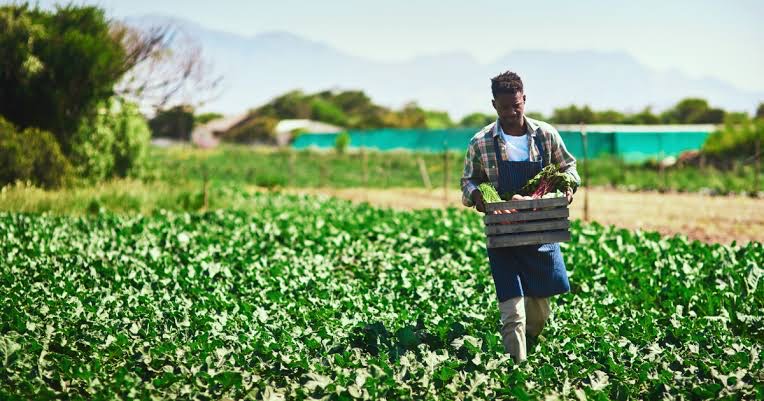
By Glory Feb, 05, 2021 Featured
Black farmers are gradually becoming extinct in a historic community of Kansas, according to recent reports.
In 1910, Black farmers made up about 14% of the US farming population, compared to recent times where the percentage is only about 1.4, and racial practices within the nation and government are to be blamed.
There have been no active Black farmers in northwestern Kansas since farmer Gil Alexander died. Following his death, Alexander’s nephew and his wife left their jobs in Arizona to take up farming to keep the family legacy alive.
Lateef and Carrie Dowdell have faced some hurdles since they arrived the historic Kansas City in 2017. The United States Agriculture Department told the couple that the agency couldn’t provide any help due to their lack of agricultural experience. An experience Dowdell describes as discriminatory.
“I definitely feel it was discrimination,” said Dowdell. “All they really wanted to do really is focus on the farmers that were assisting Gil as far as sharecropping. But as far as helping me, no.”
Dowdell expected that the agency should have sought every possible means to support Gil’s farm regardless of who the new owners are. For generations, agricultural communities have seen a steep decline in the numbers of Black farmers across the country, especially in Nicodemus. Famous for the settlement of Midwesterners and the place where former slaves were known as “exodusters” migrated to over a century ago.
“Nicodemus is a clear picture that we are facing extinction as active farmers in this country,” John Boyd Jr., president of the National Black Farmers Association. “So here today in 2021 that there is not one Black farmer that is tilling his own soil and pulling his plow and disc harrowing the ground is disheartening.”
Alexander’s nephew was only able to keep the house and the original 120-acre homestead that wasn’t included in the bank loan. Dowdell now runs a restaurant in Hill City, not so far from northwestern Kansas.
“Once Gil passed, it just didn’t deem like they cared anymore. They just wanted to get the land and move on,” Dowdell said.
The numbers of Black farmers in the US has drastically dropped due to racial discrimination at all levels of government, which has kicked them off their land. In addition, Black farmers and minority farmers have limited access to credit and technical agricultural support compared to White farmers. This has kept many Black farmers away from ever obtaining funds to run their farms, use upgraded machinery, and buy more land. Some minority farmers expressed their displeasure over the fact that USDA loans arrive too late or come with outrageous conditions about how the farmers can spend the money.
“They do not want Black farmers to have and farm ground whatsoever. Farm ground gives you power, not a lot, but it gives you power,” said 67-year-old Black Farmer Rod Bradshaw.
Many of the descendants of the Nicodemus settlers have either leased out or sold their lands to white farmers due to difficulty in obtaining farm operation loans or purchasing farm equipment. Some Black farmers were unable to leave their farms to family members after they passed away due to outstanding debts.
“There has been a lot of Black land lost in Kansas in these last 21 years – and it is devastating,” said JohnElla Holmes, executive director of the Kansas Black Farmers Association and a Nicodemus resident.
In 2020, the USDA said in an email that it has awarded more than $19 million in grants for training, outreach, and technical assistance, to disadvantaged ranchers. Yet many Black farmers say more can still be done.
Tags: Black Farmers United States Agricultural Department Nicodemus Settlement Western Kansas
Share On Facebook Twitter Linkedin Whatsapp Telegram
Categories
Latest Post
- Nigeria Taps Global Markets with $2.25B Eurobond Sale
- Boeing Shares Rise as CEO Confirms China Deliveries to Resume Next Month
- STOCK SPOTLIGHT: UNION HOMES REAL ESTATE INVESTMENT TRUST (UHREIT)
- Nvidia Q1 2025 Earnings Report Summary
- 📉 U.S. Market Summary – May 28, 2025
- CBN Launches New Financial Tools to Boost Nigeria’s Non-Interest Banking Sector! ✨
- Market Watch: Key Updates as Wall Street Awaits Nvidia and Salesforce Earnings
- U.S. Equity Markets Rally as EU Tariff Deadline Is Extended and Consumer Confidence Surges
- Things to Know Before the U.S. Stock Market Opens
- What to Expect in the Markets This Week (May 27–31)

Start investing with Acorns today! Get $5 when you use my invite link: Z24WWE
